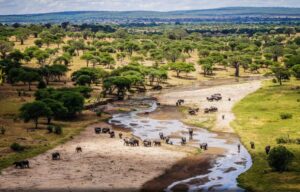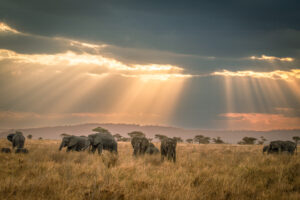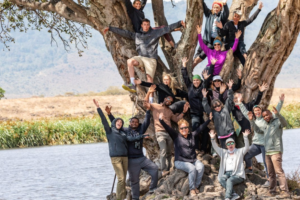
THE HISTORY OF TANZANIA
Sitting midway between the Serengeti and Ngorongoro Crater, Olduvai Gorge has been called “The Cradle of Mankind.” Prehistoric fossils of hominid remains discovered at the
If COVID taught us anything, it’s that tomorrow is never promised to any of us. And if something can be learned from climate change, it’s that our planet may not be the same tomorrow. At Wanderful Tanzania, we say, “Stop dreaming of travel and start traveling your dreams!” This motto has never been more urgent for those who’ve always wanted to take a safari. Global warming is already impacting East Africa, and those effects will continue. Time is running out to see some incredible sites and all who currently call Tanzania home.
How climate change is impacting safari adventures
In East Africa, experienced guides are already noticing differences in the landscape and to wildlife populations. For those who have “take a safari” on their bucket list, now is the time to check that box. Here are 6 reasons not to put off a safari any longer and go on a life-changing adventure as soon as possible.
Mount Kilimanjaro’s melting snow
One of the most distinctive features of the highest free-standing mountain in the world is the snow that tops it. Global warming has contributed to it rapidly disappearing, even at some of its highest points. Between 2014 and 2020, the Furtwängler Glacier, Kilimanjaro’s largest glacier, shrunk by 70%. Experts now predict the snow will be gone by 2033.
Victoria Falls drying up
The largest waterfall in the world is classified as one of the Seven Natural Wonders of the World. During the rainy seasons, it is a place of incredible beauty, with rainbows seen through the spray and mist. The African people call it Mosi-oa-Tunya, which means “smoke that thunders.” The Zambian River Authority, which monitors the waters that feed the Falls, notes the Zambezi River flows are in recession, and the BBC in 2019 showed drastic images of how these famous waters have slowed to a trickle at times.
Shift in rainfall
Those who have experienced it will tell you there’s nothing like hearing the thunder in the distance and watching a rainstorm come across the savannah. In East Africa, periods of drought are getting longer, and when the rains come, they are heavy and cause more flooding.
Migration patterns shift
The Great Wildebeest Migration is one of the greatest natural spectacles in the world. More than 1.5 million wildebeest and large numbers of zebra, impalas, Grant’s gazelle, Thompson’s gazelle, and eland annually migrate on a loop path covering 10,000 square miles through Tanzania and Kenya following the seasonal rains. With climate change impacting safari adventures, what used to occur like clockwork does not any longer; a shift in rainfall patterns means these animals may stay in one region longer or disperse over a wider area instead of moving on their usual mass migration path.
Wildlife at risk
Conservation groups say protecting species from climate change-related weather events has become critical. The World Wildlife Fund has put the African Elephant on its list as “Vulnerable” because each elephant needs 40-80 gallons of fresh water a day just for drinking. Drought has caused some elephants to die of dehydration. Lack of water and food disrupts all wildlife, not just the Big 5, and impacts entire ecosystems. Ornithologist Paul Matiku, who heads the biodiversity watch group Nature Kenya, told The Associated Press in April 2022 that “shifting rainfall patterns and increased temperatures are having serious consequences for bird populations.” It’s important to note that Africa contains about one-fifth of all known species of birds, plants, and mammals in the world and one-sixth of amphibians and reptiles.
Tanzania’s people at risk
Food and water sources are impacted for the millions who live in Africa. There are more than 150 different tribes in Tanzania. The Maasai are transhumance pastoralists who move their herds around to find fresh water and feeding grounds. These herds are integral in the Maasai diet of meat, animal blood, and milk. More frequent and severe droughts directly impact grasslands, the main grazing source. People who farm the land are also feeling the effects. Warmer temperatures are blamed for increased insect populations like the devastating swarms of locusts that decimated crops in 2021.
Reserve your spot ASAP
Wanderful Tanzania has been blessed to take small groups on incredible East African safaris several times each year. Drawing on more than two decades of experience, the WT team is eager to help you turn your safari dreams into reality with hand-picked guides who accompany you throughout the safari, eliminating the mystery and guesswork associated with an adventure of this caliber. Our experienced guides know this land and all the changes that have come to it. Even while climate change is impacting safari adventures, we are dedicated to delivering an experience you will remember forever. Find your safari and book today.
Share:

Sitting midway between the Serengeti and Ngorongoro Crater, Olduvai Gorge has been called “The Cradle of Mankind.” Prehistoric fossils of hominid remains discovered at the

I’m frequently asked, “What’s the best time of year to go on a safari in Tanzania?” My initial responses are typically rather cheeky, alternating between,

1. We Commit To Our Expertise And Focus On Tanzania In short, we are all about TANZANIA, 100% of the time… after all, it’s even

Wanderful Tanzania is an African Safari Tour Company partnership powered by Periquito Adventures & Travel in the USA.
© Copyright 2023 | Wanderful Tanzania | All Rights Reserved | Powered by Periquito Adventures & Travel